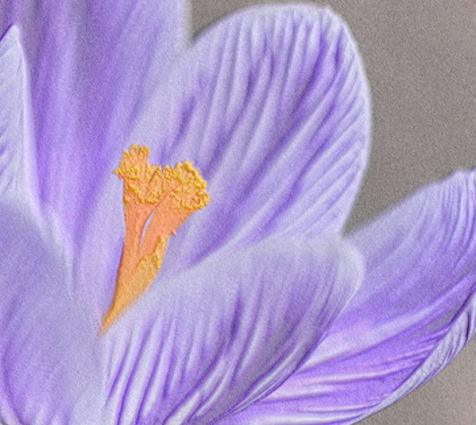Lew Watts & Rich Youmans
The Horizon’s Curve
as if. . . calculating the horizon's curve
“Hey, there’s an animal!” someone shouts, as the train rounds a bend. I am seven years old and, like all the other kids, I’ve been looking forward to this outing to watch the sunset. No one knows who paid for the trip, and most of us have never seen an animal before—well, if you discount dogs, and cats. The carriage seems to lurch as we scramble toward the window. Huw stays in his seat, as ever struggling with his limp. “It’s just a cow,” Cerys says. She always was a show-off.
old class photo in each right hand a polio mask
“This was all long ago,” the docent says, leading her group to the next gallery. “Hundreds of years ago, viruses still caused diseases that made people sick, and many even died.” The children’s eyes grow wide. “Did viruses have big fangs and claws?” one boy asks, gripping his mother’s hand tighter. “No,” the docent says, standing before the next painting. “In fact, they were invisible—you never knew you had been infected until it was too late.” The eyes grow wider. “Sometimes the diseases spread so quickly the doctors couldn’t keep up. This led to what they called plagues, and some artists depicted what they saw around them. In this painting, for example, look at the misshapen bodies tangled around one another like weeds: their withered legs, the dark blotches and blue faces. Such scenes were common across every country.” “What’s a country?” the boy asks, but by then the group has moved on.
dandelion all the wishes in one breath
The first signs would appear in early spring—the grit in the eyes, the red-rimmed lids, the streaming tears. Pills had little effect and, besides, I couldn’t afford them. And so it was with some trepidation that I approached my first date at college. “Let’s drive up to Oxford,” she said, “spend a few hours on the river.” This was June, birch season. Thankfully, several friends in med school came to the rescue with a barrage of hay fever shots. A gentle breeze was blowing clouds of pollen from the trees as we drifted away from shore. Undeterred, I stripped off my shirt and stood on the “till” like the Magdalen boatman had showed me. I was unsteady at first, but soon found my rhythm. Many years later, at a college reunion, I learned it was the needle marks and bruises that did it for her that day.
white summer dress I slide my hand up the punt pole
We barely navigated those final weeks—some didn’t make it at all. All of us wanting to be the next Gehry, Pei, Hadid, running from exam to library to exam. Those happier times (laughter over the greens and down the canal, the leafshadows playing over morning-tossed sheets) banished, our minds now crammed with displacement vectors, structural loads. We drew skyscrapers rising like bursts of whipped cream, titanium towers flaming with sun. None of us pictured the ATM additions or supermarket renovations, the battles over city codes, the clients who always wanted one more change. In those final days, we kept our heads down and crammed and crammed. And when the bells raised our eyes to those byzantine spires, for a moment we allowed ourselves to dream.
voices gathering into one prayer. . . evening star
Please god, make it stop, or at least quieter. The guy’s an animal—no idea why he needed a health spa retreat. ‘Course, I shouldn’t be listening, but it’s hard to sleep through hour after hour of gasps and moans. You could have floored me the first morning. I almost tripped over her walker when she stepped into the corridor. And at breakfast, no wonder he went back for seconds at the buffet. I guess what they say about bald men is true. Christ, they’re still going. Respect is all I can say. Full moon tonight. Open the window for a better look . . .
sultry night aroused by the calls of great horned owls
The next morning, we all meet after breakfast at the head of the trail. The McLeans are doing their husband-and-wife routine—he making up calls to every passing bird, she rolling her eyes and telling him to stop. Doug shows off to Amy Rae his new Zeiss 20 x 60 with image stabilization; Amy peers through the eyecups and purses her lips in that way that always makes my pulse flutter. Our usual guide is there, and a new guy, kind of bland—navy t-shirt, chinos, white sneakers that look a thousand years old. Basic Nikon 5. I shrug as we trek into the woods. An olive-green flash, an explosive ship-a-wheeoo-chip—give me a rain check. “White-eyed vireo,” Douglas whispers, his Zeiss raised high. From a red oak, wicka-wicka-wicka. We lift our heads in time to see a flicker’s dark-spotted breast and russet crown. New guy hangs in the rear as we jot down every sighting in our field notes—scarlet tanager, now molted olive-green; willow flycatcher, its soft, dry whit. As we cross a clearing, a skein of Canada geese passes overhead. We stop, scribble notes in our journals, start on again. But new guy hangs back. I walk a few yards, watching the sun in Amy Rae’s hair, before I stop and turn around. The Nikon hangs limp around his neck and his face is tilted skyward, his eyes closed. He’s just standing there, motionless. Everyone disappears into the woods and now there’s no sound—no wind, no birds. He opens his eyes, sees me. “Listen,” he says.
migration— wingbeats fly into the vanishing point
“Oh my god, it’s full of stars.” I was twenty years old and filled with the optimism of youth when I first saw Stanley Kubrick’s masterpiece. After only three viewings I knew HAL’s words by heart, and I could do a pretty good impersonation, if I say so myself. That reasoned, threatening tone came in handy one morning when my girlfriend’s ex came to call and tried to get in. “I’m sorry, Dave, I can’t let you do that.” Eventually, I took to smoking a couple of joints before each show, lounging ever deeper into my seat until Bowman entered the Star Gate. I could feel my lips being pulled back to a grin on those breathless, psychedelic trips through the time warp, and the sudden sense of peace when Bowman arrived safely on the other side—I always shivered at his words. That was a long time ago. I tried it again the other night. The bones still shattered in the dust at the start, and HAL was still his paranoid self, but overall the experience left me sad and despondent. Where did the hope go? Where is the star child when you need him?
white knuckles the CBD oil out of reach
The turbulence starts halfway through the flight, while crossing over arctic tundra. The cabin jolts, along with my stomach, and every seat-belt sign erupts. I slam my book shut, grip its binding as if hanging from a ledge. Why, oh why did I pack the Xanax in my checked bag? From out of nowhere, the captain’s pat, reassuring tone instructs everyone back to their seats—but did I catch a bit of urgency? I look out the pressurized glass. Deepening twilight has cast the snow in an unearthly violet glow. The plane shakes again and I tighten my grip. The next jolt shakes free all the old aches: the people I’ve lost touch with, the countries I’ve never visited, the book still unwritten. How do those oxygen masks work, and where is the nearest exit? I close my eyes, waiting for the next bout. Five seconds, nothing. . . ten seconds. . . . I hear the seat-belt sign ping off and open my eyes. Everyone around me has returned to their books, their iPads. I look out the window, at the darkening landscape, then pick up the flight magazine and turn to the cocktails section.
diary page its whiteness in the morning light
Note: Regular text: Lew Watts. Italicized text: Rich Youmans. The links are written in an “open” style. Each haiku serves as both a cap to one haibun and a springboard into the next, with each each poet linking and shifting as they go along. There are no predetermined topics, seasons, or images that must appear, and the only “rule” is to try to leap as imaginatively as possible without losing the link.
About the Authors

Lew Watts is the author of Tick-Tock (Snapshot Press, 2019), a haibun collection that received an Honorable Mention in the Haiku Society of America’s 2020 Merit Book Awards. His publications include the novel Marcel Malone and the poetry collection Lessons for Tangueros. He lives in Chicago.

Rich Youmans lives on Cape Cod with his wife, Alice. His books include Shadow Lines (Katsura Press, 2000), a collection of linked haibun with Margaret Chula, and Head-On (Red Bird Chapbooks, 2018).

Thank you both for the experience and the exemplary instruction.